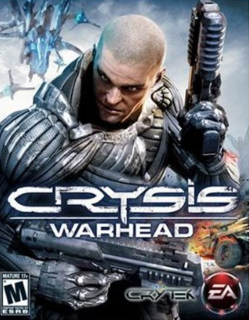Although not as groundbreaking in its campaign, Warhead is more direct and faster-paced than Crysis, with few stumbles.
But what does all this have to do with Crysis Warhead, a game whose release wasn't even as nearly ground-breaking as Crysis, nor famous for much more than the name that PC gamers could wag their condescending fingers at those still slobbering over their consoles -- and rightfully so, for the PC has always been the keen elder of videogame extravaganza and versatility (for lack of a better word)? Considering Warhead will never be seen as anything more than a spin-off to the once-epic Crysis for the PC, it is best to know what to keep a sharp eye out for when playing and reviewing FPS games.
What was so incredibly memorable for me in 2007's Crysis, was the semi-open world, chin-pondering plot, explorable vehicle maneuvering, and, on top of it all, the Nano Suit -- oh, yeah, the graphics were kick-ass, too. It is well pointed out that Crysis served simply as a tech demo for Crytek's graphics engine and potential game universe, but it is a tech demo that provided fun challenge, and a unique way of tackling many of the in-game situations the gamer is pitted against during the fairly-extensive campaign. It has bugs, outlandish optimization, bare multiplayer, and a thin story (but not thin atmosphere), but it redeems itself through the gameplay (when those aforementioned bugs don't hinder the immersion) and visual background. Although the soundtrack gets washed into the background most of the time, its present, and well-"suited" (pun intended).
Warhead takes all of this, scales it down a bit for an eight-hour compaign, and mixes in the alien break-out with Korean political conflict. Nomad, our surprisingly not silent protagonist in the first game, is on the other side of the island, while you play as Psycho, a Nano Suit-wearing, British-accented, smart-assed super-soldier that give Nomad a run for his money; there are no gameplay differences between Crysis and Warhead, Nomad and Psycho. The plot, though not as focused, latterly, on alien smack-downs, is fuller, with control tweaks for vehicles and busting out those breaching alien and Korean guns.
In terms of improvements, Warhead comes packed with Crysis Wars, a disc solely focused on multiplayer mayhem -- with, this time, three multiplayer options, the third being Team Deathmatch, as opposed to just Deathmatch and capture points present in Crysis. All you do here is annihilate opponents on different maps and with your skills and different guns. The maps are large, and it's simple fun. It isn't the multiplayer present in extant shooters like Halo, Call of Duty, Crysis 2, Battlefield: Bad Company, Killzone, Gears of War, Uncharted, etc. because there is virtually no upgrading whatsoever; it's simple, Internet-connected, shooting mayhem. And, in the end, isn't that what it's all about?
No, it's not.
Contemporary gamers want rewards for their teeth-grinding, controller-throwing, and enumerable hours spent on listening to prepubescence and rage. And that's fine. It's also fine that so many shooters, mediocre or not, get cast into the sands of time (Black, Call of Duty 2, Medal of Honor: Allied Assault -- Oh, did I forget one?). That's what advancements and semi-contemporary futurism is all about. There's always critique, there's always disliking: a game that's missing expected or "revolutionary" (don't worry, that term will NEVER be thrown around too often) features; a game that's far too mainstream and popular; a game that's "consolized;" a game that doesn't live up to predecessors of the franchise or genres before it; and a game whose voice acting, and/or visuals, and/or gameplay, and/or plot just plain suck. Period.
Speaking of sucking, what sucks about Warhead? Well, there are fewer bugs, more graphical inerrancies, better narrative, including a third-person, cinematographic perspective, and it provides more of a challenge despite questionable A.I. I would say that there isn't much that does suck about Warhead. But it isn't perfect. I would dare say that if Crysis had most of these characteristics, then it would be even more of a phenomenal shooter, but alas, that's what improvements and feedback over time are served as.
It feels like a spin-off, and it somewhat feels like an MSRP $40 dollar game; but it's polished, it's involving, and even though it isn't as fresh, and perhaps a little too heavy on predictable military foregrounds, Warhead is worth it. But only for those shooter fans that aren't still playing Counter-Strike, Half-Life 2, and Deus Ex, that expect something that isn't so . . . "modern."

